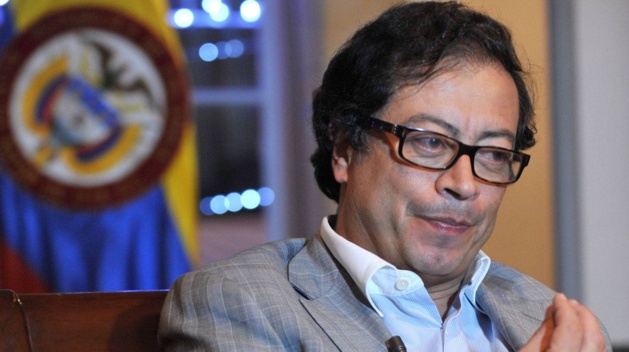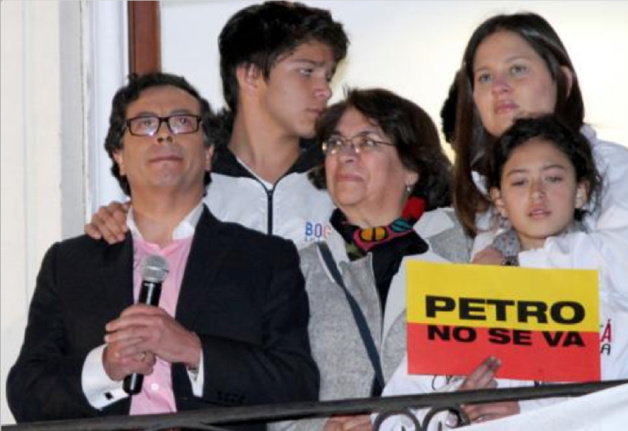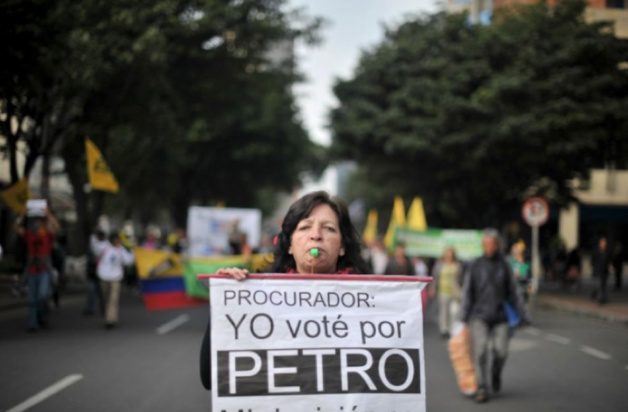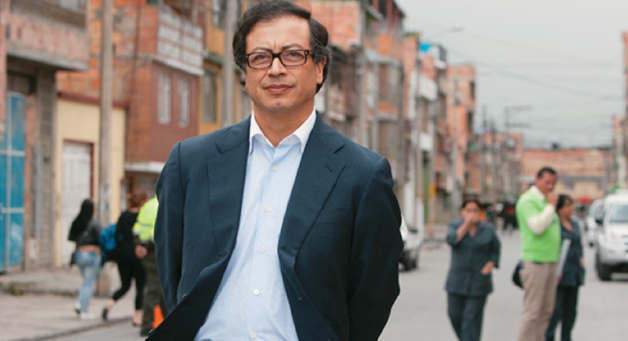
Crédit Semana
Last December, the Journal International had already published an article announcing the mayor’s dismissal by public prosecutor, Alejandro Ordóñez. Since then, Bogota’s mayor has lodged an appeal for his dismissal to be reconsidered. However, on Wednesday 19th March, President Juan Manuel Santos officially removed Gustavo Petro from his position.
FINALLY PETRO IS LEAVING…
According to his past involvement in the ‘Alternative Democratic Pole’ and now with the ‘Progressive National Movement’ (centre left), Gustavo Petro is known to be an opposition figure in Colombia. During Álvaro Uribe’s second term, Petro was notably at the source of profound debates at the Senate with the aim of highlighting Uribe and his party’s links with the paramilitaries. Gustavo Petro stood as a candidate for presidency during the 2010 elections, but was defeated in the first round. He was consequently elected mayor of the capital in 2012.
The ‘Petro’ affair has now been part of the news in Colombia for a year. Elected in October 2011, the centre-left mayor of the capital, Gustavo Petro, has been the subject of a measure of dismissal in January 2013 for ‘administrative mistakes’, which he considers to be a ‘conspiracy’.
The ‘revocatoria’ (dismissal process) is a mechanism of citizen participation aiming at exercising a certain control over the State’s civil servants’ policies. In the case of Gustavo Petro, the dismissal demand was made by Miguel Gómez Martínez, a Chamber representative of the current president’s party (‘Party of the U’). The demand, put forth one year after the beginning of the mayor’s term, which is the minimum requirement for such a demand according to the Colombian Constitution, was justified, among other things, by the bad management of sanitation services and the downfalls of the capital’s transportation services. Indeed, Petro changed the structure of waste collection services upon his accession to Bogota’s town hall by opening the market to new companies in order to break with the private monopolies, which had been present for years. Nonetheless, in December 2012, this new system was at the origin of complete chaos in the capital that, for three days, was deprived of waste collection.
On the 9th of December 2013, he was dismissed by the ultra-Conservative prosecutor Alejandro Ordóñez, which provoked an important wave of protest in the capital, led by the famous slogan ‘¡Petro no se va!’ (‘Petro is not leaving!’) As previously mentioned, an appeal was lodged by Bogota’s mayor but later dismissed. Nevertheless, his dismissal was temporarily suspended – in January – while his case was studied once again.
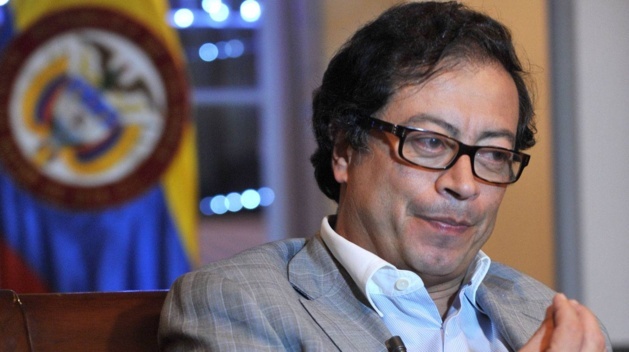
The CIDH, an internal body of the Organisation of American States (OEA), was appealed to on the matter and asked on the 18th of March that ‘precautionary measures’ in favour of Gustavo Petro be considered, so that he could complete his term. However, the next day, President Juan Manuel Santos decided to refuse these ‘precautionary measures’, explaining that ‘Colombian justice acts in a transparent, efficient and appropriate way’, and officially ratified the mayor of Bogota’s dismissal. In the process, Juan Manuel Santos nominated the current Minister of Labour, Rafael Pardo, interim mayor of the capital.
Powerless in front of the signature of his dismissal by President Santos, Petro expressed himself the same evening from the balcony of the town hall in front of 1,500 supporters: ‘If this government is not capable of accepting the people’s decisions, nor justice’s decisions, the Colombian people have to aim for a general strike for a Constituent Assembly and peace in Colombia. Then, we will be by your side to make Colombia gain self-respect and make Bogota gain self-respect, to make democracy and peace respected in Colombia and to make them respected ourselves.’
WHAT ABOUT DEMOCRACY ?
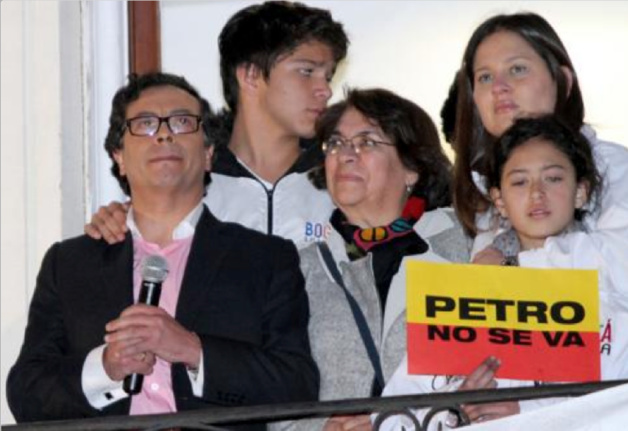
The Petro affair is a scandal in Colombia and causes concern on an international level because it represents the fragility of democracy in the country. Bogota’s inhabitants elected Gustavo Petro democratically for a term running from 2012 to 2015. His deposition – though it has been signed by another elected representative, the current President of the Republic – was at first ratified by a non-elected civil servant, Prosecutor Ordóñez. For many of Petro’s supporters, the very principle of the ‘revocatoria’ directly challenges the inhabitants of the capital’s freedom to choose their political representative. As the Colombian newspaper El Espectador noted, Petro’s dismissal was a totally disproportionate response to the facts that he was reproached for, which themselves were motivated, most of all, by the political interests of the highest spheres of the State.
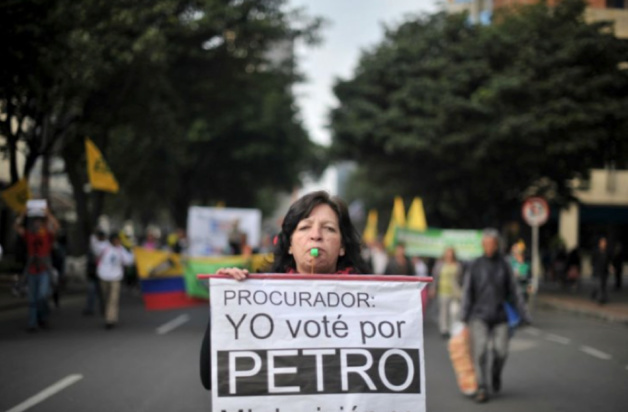
The scandal was so important in the country and on the international scale that the Inter-American Commission on Human Rights was called upon to decide the matter. Its answer was support for Mayor Petro and a proposal for ‘precautionary measures’, such as the restriction of the powers of the public prosecutor. However, these measures were categorically rejected by the Colombian State, whose representatives have declared that the National Constitution prevailed over the whole of international treaties. Decisions of the IACHR are, indeed, only recommendations, to which States have no obligation. However, Colombia is placing itself in a very delicate situation by refusing to listen to recommendations from such an important continental body. Moreover, Santos’s decision consisted of a real political risk, especially since he stands as candidate for reelection in the next presidential elections in May 2014.
Though the vast majority of Colombians now seem resigned to the mayor’s dismissal, after months of struggle and demonstrations, a minority continues taking action in order to make their rights and democracy triumph in the country. According to a young supporter of Petro, present during this week’s demonstrations, Carlos Alejandro Rincón Bustos, the dismissal of the mayor of the town is at the root of collective disillusionment of leftist supporters in Colombia: ‘For years in Colombia, we have been facing a fake democracy in which, as Petro underlined on March 19th, voting has lost all its signification. In our country, unfortunately, power serves – still nowadays – the interests of a minority of individuals. Demonstrations are now one of our only means to show our opposition to President Santos’s decision. But we remain realistic, only an intervention from an international body such as the IACHR will now allow an evolution of the situation.’















